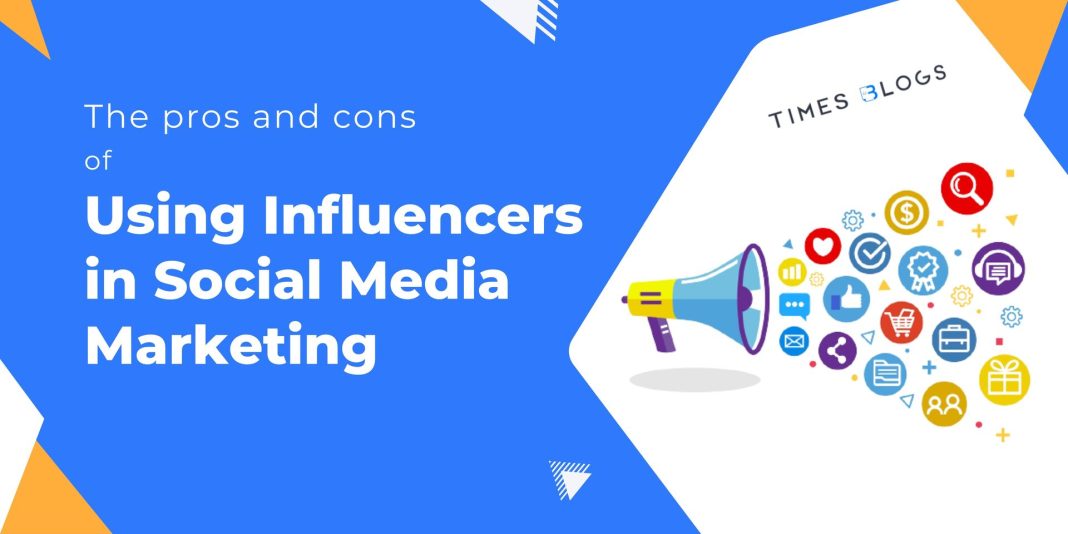Social media has revolutionized the way businesses market their products and services. With the rise of social media platforms like Instagram, TikTok, and YouTube, influencers have become an increasingly popular marketing tool for businesses. Influencers are individuals with a large following on social media who can influence their audience’s purchasing decisions. In this blog post, we will discuss the pros and cons of using influencers in social media marketing.
Table of Contents
What is Influencer Marketing?
Influencer marketing is a type of marketing that leverages the influence and popularity of individuals on social media platforms to promote or endorse products or services. It involves partnering with individuals, known as influencers, who have a significant following in a particular niche or industry.
The influencer marketing process typically begins with a brand identifying a group of influencers who align with their brand values and target audience. These influencers can be found by searching social media platforms, using influencer marketing software, or working with influencer marketing agencies.
Once the brand has identified potential influencers, they will typically reach out to them with a proposal to collaborate. The collaboration can take many forms, including sponsored posts, affiliate marketing, giveaways, or product reviews. The specific terms of the collaboration will depend on the brand’s goals, budget, and the influencer’s preferences.
Influencer marketing campaigns can be highly effective in reaching a broad audience and generating brand awareness, engagement, and sales. This is because influencers have built a loyal following who trust their opinions and recommendations. By partnering with an influencer, a brand can tap into this existing audience and reach consumers who are likely to be interested in their products or services.
Influencer marketing has become increasingly popular in recent years due to the rise of social media platforms and the decline of traditional advertising methods. Consumers are more likely to trust recommendations from individuals they perceive as authentic and genuine, rather than traditional advertising methods like banner ads or TV commercials.
It’s important to note that influencer marketing must be executed in a transparent and ethical way. The Federal Trade Commission (FTC) requires influencers to disclose any paid or sponsored relationships with brands, and failure to do so can result in fines and penalties.
Influencers in social media marketing
Influencers are individuals who have a significant following on social media and are considered to have an impact on their audience’s purchasing decisions. Influencer marketing is a type of social media marketing that involves collaborating with influencers to promote products or services to their followers.
Influencers can be celebrities, industry experts, or individuals who have built a strong following on social media through their content and engagement with their audience. They typically specialize in a particular niche, such as fashion, beauty, travel, or fitness.
Working with influencers can be an effective way for businesses to reach new audiences and build brand awareness. When an influencer shares a sponsored post or endorsement for a product or service, their followers are more likely to trust and engage with the brand.
To work with influencers, businesses typically identify relevant influencers in their niche, reach out to them with an offer, and negotiate the terms of the collaboration. This can include details such as the type of content the influencer will create, the duration of the partnership, and the compensation they will receive. The success of an influencer marketing campaign can be measured using metrics such as reach, engagement, and sales.
Pros of Using Influencers in Social Media Marketing
- Access to a Large Audience
One of the main benefits of using influencers in social media marketing is their ability to reach a large audience. Influencers have a dedicated following that trusts their opinions and recommendations. By partnering with an influencer, businesses can tap into their audience and increase their brand awareness.
For example, Glossier, a skincare and makeup brand, collaborated with beauty influencer Emily Weiss to launch its line of beauty products. The collaboration helped Glossier reach a new audience and increase its brand awareness.
- Authenticity
Influencers are known for their authenticity and transparency with their audience. Their followers trust them to provide honest opinions and recommendations. When an influencer promotes a product or service, their audience perceives it as a genuine recommendation, which can lead to increased trust in the brand.
For example, Nike collaborated with basketball player LeBron James to promote its “Equality” campaign. James has a strong following and is known for his activism, which made the campaign more authentic and resonated with his audience.
- Increased Engagement
Influencers have a high engagement rate with their audience, which can help businesses increase their engagement as well. When an influencer promotes a product or service, their audience is more likely to engage with the content, whether it’s through likes, comments, or shares.
For example, fashion brand Revolve collaborated with influencer Aimee Song to promote its line of clothing. The collaboration helped Revolve increase its engagement and reach a new audience.
- Cost-Effective
Working with influencers can be a cost-effective marketing strategy compared to traditional advertising methods. Influencer marketing campaigns can be tailored to fit a business’s budget, and the ROI can be significant.
For example, energy drink company Red Bull partnered with influencer Felix Baumgartner to promote its product. Baumgartner completed a record-breaking skydive sponsored by Red Bull, which helped the brand reach a new audience and increase its sales.
- Creative content:
Influencers are content creators, and they are skilled at creating engaging and creative content that resonates with their audience. By partnering with an influencer, you can get access to this type of content, which can be more effective than traditional advertising methods. Influencer-generated content is also more likely to be shared by their followers, which can increase your brand’s reach.
Cons of Using Influencers in Social Media Marketing
- Fake Followers and Engagement
One of the main drawbacks of using influencers in social media marketing is the prevalence of fake followers and engagement. Some influencers buy fake followers or engage in fake engagement tactics like buying likes or comments to increase their perceived influence. This can lead to a misrepresentation of their actual audience and may not provide the expected ROI for businesses.
For example, beauty influencer Amanda Ensing was criticized for allegedly buying fake followers and engagement on her social media accounts. The scandal led to brands severing their partnerships with her.
- Lack of Control
When working with influencers, businesses may have limited control over the content they create. Influencers have their own voice and style, which may not align with a business’s brand identity or messaging. This can lead to a lack of control over the content that is being promoted.
For example, luxury fashion brand Dolce & Gabbana faced backlash when influencer Mariano Di Vaio shared a video promoting the brand’s products that was seen as culturally insensitive. The controversy led to the brand pulling the campaign and issuing an apology.
- Limited Reach
While influencers have a dedicated following, their reach may not extend beyond their niche audience. This can limit the potential reach of a marketing campaign and may not provide a significant ROI for businesses.
For example, fast-food chain Wendy’s partnered with influencer Chrissy Teigen to promote its new Spicy Chicken Nuggets. While Teigen has a large following, her audience may not necessarily be interested in fast food, which may limit the campaign’s reach.
- Short-term impact:
Influencer marketing can have a short-term impact on your business. While influencer-generated content can be engaging and effective, it may not have a lasting impact on your audience. Once the influencer stops promoting your brand, the impact on your audience may diminish. To combat this, it’s important to create a long-term strategy and work with influencers who can help you build a lasting relationship with your audience.
- Unpredictability
Working with influencers can be unpredictable. Influencers may change their mind or may not deliver on their promises, which can cause delays or lead to a failed campaign.
For example, influencer James Charles was set to promote a collaboration with clothing brand Wet n Wild, but the campaign was pulled after Charles faced controversy for inappropriate behavior.
Examples of successful influencer marketing campaigns:
- Daniel Wellington:
Daniel Wellington is a watch brand that has used influencer marketing to grow its business. The brand partnered with a large number of influencers, including Kendall Jenner and Selena Gomez, to promote its watches on social media. The influencers posted photos of themselves wearing the watches and included a discount code for their followers. This campaign was highly successful, and the brand saw a significant increase in sales.
- Glossier:
Glossier is a beauty brand that has built its business on social media. The brand has a dedicated following on Instagram, and it has used influencer marketing to reach a new audience. The brand partnered with influencers to promote its products and used user-generated content to showcase its products in action. This campaign was highly successful, and the brand has continued to use influencer marketing to grow its business.
- H&M:
H&M is a clothing brand that has used influencer marketing to promote its clothing on social media. The brand partnered with influencers to promote its sustainable clothing line, and it used user-generated content to showcase its clothing in action. This campaign was highly successful, and it helped the brand promote its sustainable values to a new audience.
Conclusion
Using influencers in social media marketing can be an effective strategy for businesses to reach a large audience, increase brand awareness, and generate engagement. However, it is essential to weigh the pros and cons carefully before embarking on an influencer marketing campaign. It is important to choose the right influencer who aligns with the business’s brand identity and values and ensure that their following and engagement are genuine. Additionally, businesses must have a clear agreement with the influencer and maintain control over the content that is being promoted. By doing so, businesses can minimize the risks associated with using influencers in social media marketing and maximize the potential benefits.




